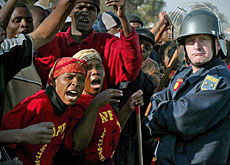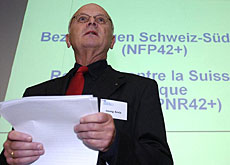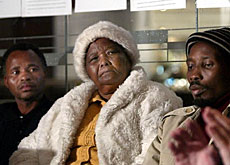Apartheid victims demand Swiss compensation

The Swiss government has been called on to apologise to and compensate South African victims of human rights abuses for its policies during apartheid.
The Apartheid Debt and Reparations Campaign (ADR) has sent an open letter to the government, which it accuses of helping prolong murder, abduction, rape, forced resettlement, torture, repression and other state-approved crimes.
The letter was signed by 268 Swiss personalities and 17 organisations involved in politics, culture, science, religion and development. The ADR also criticised the Swiss government for not taking part in international sanctions against the South African regime.
The letter comes exactly a year after research was published by the Swiss National Science Foundation concluding that Switzerland considered trade freedom to be more important than human rights in its dealings with the apartheid regime in South Africa.
The government refused to comment on the report.
“Relations between Switzerland and South Africa”, carried out by Bern University historian Peter Hug, was the last of ten reports into the issue.
It revealed that Swiss connections to South Africa were closest during the 1980s, at the height of human rights abuses and repression of the black resistance movement by the white minority. These military, intelligence service, armaments industry and nuclear relations were closer than previously thought.
The Swiss authorities at the time justified their involvement with Pretoria by arguing that South Africa was a bastion against communism, but Hug said that while Switzerland’s decision not to apply international sanctions against South Africa benefited the apartheid regime in Pretoria, it did not extend its existence.
Legal rejection
In November 2004 a United States judge rejected a class-action lawsuit brought by victims of apartheid against major multinationals, including leading Swiss banks.
The litigation, filed in New York on behalf of thousands of black South Africans, accused around 30 multinationals – including Swiss firms UBS, Credit Suisse, Nestlé, Novartis, Unaxis, Sulzer, Holcim and Ems Chemie – of supporting the former apartheid system.
The judge called the actions of the apartheid regime “repugnant” and said decisions by the corporations to do business with it may have been “morally suspect or embarrassing”.
But he said there was no meaningful assertion by the plaintiffs that actions by these firms directly caused the alleged murders, torture, crimes against humanity and other heinous acts in South Africa from 1948 until 1984.
swissinfo with agencies
In 2000 the Swiss government charged a team of 40 researchers with examining economic ties, contacts between churches, the international context, the public perception of the policy towards Pretoria and Switzerland’s attitude towards UN sanctions.
The team was led by Georg Kreis, president of the Swiss National Science Foundation and president of the Federal Commission against Racism, who called the period a “dark chapter in Switzerland’s past”.
Bern historian Peter Hug said the research process, which had a federal budget of SFr2 million ($1.57 million), had been fraught with difficulties.
In April 2003 the government blocked access to the apartheid-era archives, which named Swiss businesses.

In compliance with the JTI standards
More: SWI swissinfo.ch certified by the Journalism Trust Initiative



You can find an overview of ongoing debates with our journalists here. Please join us!
If you want to start a conversation about a topic raised in this article or want to report factual errors, email us at english@swissinfo.ch.